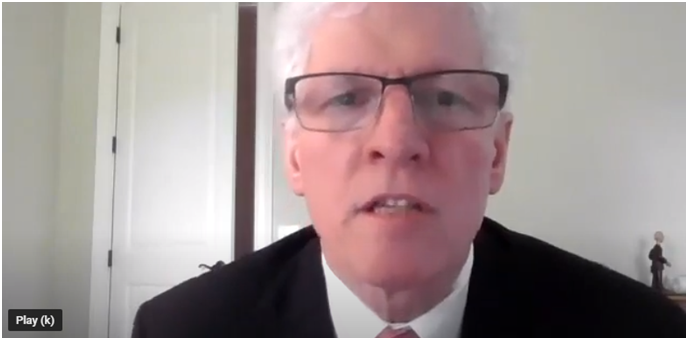We speak to John Guerard, Jr., Ph.D., Interim Director of Quantitative Research and Chairman of the Scientific Advisory Board at McKinley Capital Management, LLC.
McKinley Management is an ESG Investing Awards 2022 Finalist for Best Specialist Research for “ESG and Expected Returns on Equities: The Case of Environmental Ratings”. Tell us more about this research.
Yes, thank you! I was honored to be included in the impressive group of researchers selected as finalists for this award.
I was nominated for the Geczy-Guerard paper, “ESG and Expected Returns on Equities: The Case of Environmental Ratings”. The paper, presented in May 2021, at Wharton, has been delayed bit should be published in an Oxford University Press (OUP) book in 2022. The book editor, Professor Olivia Mitchell, at Wharton, told me last week that the book was still under at
In our paper, Professor Geczy and I created our CTEF and USER (the MCM 10-factor Public Model) using the Wharton Research Data Services (WRDS) databases for the 1975 – 2017 time. From our paper, let us show tables, for the underlying model data for 1975-2017, used for SRI / ESG Portfolio construction with the KLD Environmental (ENV) variable, 1995-2017. In Table, we report over 40 years of quintile spreads.
A summary of the paper is that buying stocks with good CTEF and USER scores and good ENV scores is preferable to buying lowly-ranked CTEF and USER stocks with poor ENV scores. As we said, the research suggests “one can have his or her cake, and eat it too” which is good for investors.
You’ve been with McKinley Capital for more than 17 years as the Director of Quantitative Research and now the Chairman of the Scientific Advisory Board. McKinley has an interesting approach blending quant and qualitative in its investment process. Tell us about that.
McKinley Capital is a growth style asset manager who uses quantitative analysis plus a human qualitative overlay to create investment solutions for our clients. This narrow and specific investment style has little, if any, overlap with other managers. You can think of it as the convergence of the best of quant and qual – we call it systematic.
What’s McKinley working on these days?
Well, we are always testing our proprietary quantitative model and working hard to provide returns to our clients! As for new developments, we are in the final stages of creating a minimum volatility strategy. We are extremely excited about the innovation it can provide investors. The idea for this quant-only strategy (our first at McKinley) came from some research we were working on in early 2021 that explored the concept of fundamental complexity. Basically, Fundamental Complexity captures the inherent difficulties analyzing the operating segments of a firm that arise from the unique ways the firm makes operating, investing, and financing decisions.
Our research showed that 20% of price volatility is driven by fundamentals, and this fundamental component of volatility is precisely what gives rise to a low volatility risk premium. Fundamental MinVol strategy is not a proxy value or quality strategy, and it does not take excessive active industry bets. Our research showed that 61 – 94% of the alpha in our simulated fundamental minimum volatility strategy was derived from stock selection. I’ve been presenting this research to clients with our CEO/CIO Rob Gillam, and they have been very receptive and excited about this new strategy.
Have any new quantitative research projects that you are working on now? Anything particularly useful to asset owners in volatile economic times like the most recent quarter?
Yes! I’ve got several projects in the works. First, Standard & Poor’s made its database available for researchers last year as part of the Dow Jones Industrial Average (DJIA) celebration of its 125th birthday. During that celebration, Dimitrios Thomakos, my co-author of 25 years and department chair of Business Administration at the University of Athens in Greece, and I received the daily closing prices of the Dow from 1896 to 2021, and the S&P from 1928 to 2021. We are currently analyzing the time series by estimating models previously published in the International Journal of Forecasting.
Our goal is to publish a definitive study of daily closing prices for the 126 years of the Dow, and offer our forecast of the next 6-9 months and 3 years of the Dow and S&P. For those of you interested, these time series models are illustrated in Guerard, Saxena, and Gultekin, Quantitative Corporate Finance, third edition, in chapters 12 and 13 (publication is forthcoming from Springer). Of note for this interview, my ESG modeling for 1995 to 2021 is reported in chapter 22 of the book. Last, but not least, I recently completed my book on business cycles, including the COVID-19 time period. This book is being published by Palgrave and I expect it out soon.
McKinley Capital is a quant-based manager that has always been committed to supporting the study and development of applied investment research. The articles McKinley staff have written are published in peer-reviewed journals, practitioner journals, textbooks and even books listed in the Library of Congress. Our research is widely available to asset owners and consultants and can be quite useful in times of economic uncertainty. One might think current times are unusually uncertain, but I’d suggest you look at the time period 1896 to 2021 as a whole. With this broader view, you will see that uncertainty has existed throughout the entire history of U.S. stock prices. Uncertainty did not emerge in 2007-2008, or even 1929…..it’s been there since the beginning. Asset managers will want to use the most advanced statistical techniques and will find they are most relevant in their application.
What’s McKinley’s perspective on the quant’s role in ESG?
Quant researchers and managers have been writing about and publishing ESG research (and its predecessor term SRI – Socially Responsible Investing) for 30+ years. There is an enormous amount of quant-driven research available to investors which can help them draw conclusions and make decisions about ESG investing. I think quant’s day in ESG is coming and will prove to be a benefit to investors by offering them a quantitative approach and analysis of if and how their investments are aligning with their values. Quant strategies lend themselves to technical attribution and performance analysis of ESG performance. This means that investors using a quant-strategy will typically be better able to determine if they achieved their ESG goals. Quants can also mathematically determine if ESG values are additive to returns. And quants have the ability to customize which means they can precisely create a portfolio that reflects the value of the client – not the value of the asset manager. This is particularly valuable today as there are as many definitions of ESG as there are people. It’s harder to find a packaged strategy that perfectly aligns with each investor’s unique values and goals. This sets up quants perfectly to play a significant role in ESG investing.
As Chairman of McKinley’s Scientific Advisory Board, you have gotten to work with Harry Markowitz and some leaders in the field like Shijie Deng.
Yes, one of the things I really appreciate about McKinley Capital is the firm’s focus on and continued investment in research. As an asset manager, it’s easy to get narrowly focused in your own investment discipline and your own strategies. But to stay ahead of the pack, you have to be current on what’s going out there. You want your team to hear from the experts in the space who are leading true change and innovation. Our Scientific Advisory Board is 10 professionals who offer us their perspective on everything from transaction cost analysis, to data mining, artificial intelligence and machine learning, to healthcare transformation. Of course, Harry’s legacy speaks for itself, and it’s been an honor to work with him in my career. Our Scientific Advisory Board is meeting again this April and we are looking forward to the conversation and the innovation it sparks.
View online interview with John Guerard:
Disclosure: McKinley Capital Management, LLC (MCM) is an investment adviser registered with the U.S. Securities and Exchange Commission (SEC). Neither the information, nor any opinion, contained in this interview constitutes a solicitation or offer by MCM or its affiliates to buy or sell any securities, futures, options or other financial instruments, nor shall any such security or strategy be offered or sold to any person in any jurisdiction in which such offer, solicitation, purchase, or sale would be unlawful under the securities laws of such jurisdiction. A copy of MCM’s Form ADV Part 2A, which discusses MCM’s business operations, services and fees is available upon written request. Decisions based on information contained in this presentation are the sole responsibility of the user and must not be taken as an investment recommendation or advice of any kind whatsoever (whether impartial or otherwise). Investing involves the risk of loss and investors should be prepared to bear potential losses. 2022 McKinley Management. All rights reserved.


